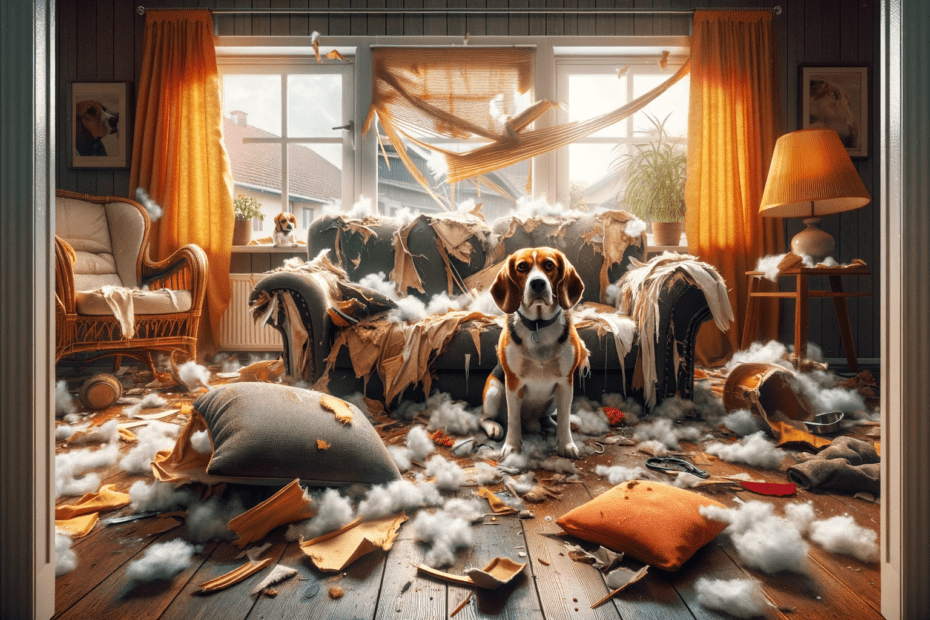Do you ever wonder why your furry friend chews everything in sight? In this article, we will explore the common reasons behind destructive chewing in dogs.
From teething to separation anxiety, we will delve into the various factors that contribute to this behavior.
Additionally, we will provide strategies for managing stress-related chewing and tips for redirecting your dog's chewing onto appropriate toys.
So, let's dive in and uncover the mysteries behind your pup's chewing habits.
Key Takeaways
- Teething discomfort and the need for relief and soothing can contribute to destructive chewing behavior in puppies.
- Separation anxiety can also be a cause of destructive chewing, as dogs become distressed or anxious when separated from their owners.
- Boredom and lack of mental stimulation can lead to destructive chewing, highlighting the importance of providing enrichment toys and regular exercise for dogs.
- Stress-related chewing can be managed by providing mental stimulation, using positive reinforcement, creating a safe environment, and implementing relaxation techniques.
Common Reasons for Destructive Chewing
There are four common reasons why your dog chews destructively. One of these reasons is teething discomfort. Just like human babies, puppies experience discomfort and pain when their teeth are growing. This can lead them to chew on objects in an attempt to alleviate the discomfort. It's important to provide appropriate chew toys during this time to redirect their chewing behavior and provide relief.
Another reason for destructive chewing is boredom or lack of mental stimulation. Dogs are intelligent animals and need mental stimulation to keep them engaged and entertained. When they're bored, they may resort to destructive chewing as a way to alleviate their boredom.
Stress or anxiety is also a common cause of destructive chewing. Dogs may chew on objects as a way to cope with their anxiety or to release pent-up energy. Identifying the source of stress and finding ways to alleviate it can help reduce this behavior.
Lastly, some dogs may simply have a natural inclination towards destructive behavior. Certain breeds, such as terriers, have a strong instinct to chew and may require additional training and supervision to prevent destructive chewing.
Understanding these common reasons for destructive chewing can help you address the issue and provide appropriate solutions to ensure your dog's well-being and prevent damage to your belongings.
Understanding the Role of Teething in Chewing Behavior
To understand your dog's chewing behavior, it's important to recognize the role teething plays in their need to chew destructively.
Teething is a natural process that puppies go through as their baby teeth are replaced by permanent adult teeth. Just like human babies, puppies experience discomfort and pain during this stage, which can lead to an intense urge to chew.
Chewing helps alleviate the discomfort by providing relief and soothing the gums. This is why puppies tend to chew on anything they can find, including furniture, shoes, and household items.
It's crucial to provide appropriate chew toys during this time to redirect their chewing behavior and protect your belongings. Understanding the role of teething in chewing behavior can help you address the issue effectively.
Recognizing Separation Anxiety as a Cause of Destructive Chewing
If your dog exhibits destructive chewing behavior, it's important to recognize that separation anxiety can be a contributing factor. Separation anxiety is a common condition in dogs that occurs when they become distressed or anxious when separated from their owners. This anxiety can manifest in destructive behaviors, such as chewing furniture, shoes, or household items.
To address separation anxiety and its associated destructive chewing, it's crucial to implement effective behavioral modification techniques. One such technique is desensitization, which involves gradually exposing your dog to short periods of separation and gradually increasing the duration over time. This helps your dog become more comfortable with being alone and reduces their anxiety.
Another technique is counter-conditioning, which involves associating positive experiences with being alone. This can be done by providing your dog with special toys or treats that they only receive when they're alone. By creating positive associations with being alone, your dog may begin to feel less anxious and be less likely to engage in destructive chewing.
It is also important to provide your dog with mental and physical stimulation to alleviate their anxiety. Engage in regular exercise and play sessions to help them release excess energy. Additionally, consider using puzzle toys or interactive feeders to keep their minds occupied when they're alone.
Addressing Boredom and Lack of Mental Stimulation
To address boredom and lack of mental stimulation, it's important to provide enrichment toys for your dog. These toys can help keep your dog engaged and entertained, preventing them from resorting to destructive chewing behaviors.
Additionally, regular exercise is crucial for dogs as it helps to release pent-up energy and stimulate their minds. By incorporating both mental and physical activities into your dog's routine, you can help alleviate boredom and reduce the likelihood of destructive chewing.
Enrichment Toys for Dogs
You can provide your dog with a variety of enrichment toys to alleviate boredom and stimulate their mind. These toys are designed to engage your dog's cognitive abilities and keep them mentally stimulated.
Here are some options to consider:
- Interactive puzzles: These toys require your dog to solve a puzzle or complete a task to access a treat or a reward. They help challenge your dog's problem-solving skills and keep them entertained for longer periods of time.
- Treat dispensing toys: These toys are designed to hold treats inside, and your dog has to figure out how to get the treats out. This not only provides mental stimulation but also satisfies your dog's natural instinct to forage and search for food.
- Squeaky toys: These toys make a noise when your dog bites or squeezes them, providing auditory stimulation and keeping your dog engaged.
- Chew toys: These toys are great for dogs that love to chew. They not only help keep your dog's teeth clean and healthy, but also provide a satisfying outlet for their chewing needs.
Importance of Exercise
One way to address boredom and lack of mental stimulation in dogs is by incorporating regular exercise into their daily routine. Exercise is essential for dogs as it helps to fulfill their physical and mental needs.
Providing opportunities for exercise not only helps to burn off excess energy but also prevents dogs from becoming bored and engaging in destructive chewing behaviors. Regular exercise promotes socialization by allowing dogs to interact with other dogs and humans, enhancing their social skills and reducing anxiety.
Interactive play, such as playing fetch or engaging in agility exercises, provides mental stimulation and keeps dogs mentally engaged. This mental stimulation is vital for their overall well-being and helps to prevent boredom-related behaviors like chewing.
Remember to provide adequate exercise and interactive play to keep your dog mentally and physically healthy.
Strategies for Managing Stress-Related Chewing
For effectively managing stress-related chewing in dogs, it's essential to implement appropriate strategies. Here are some strategies that can help you manage your dog's stress-related chewing:
- Provide mental stimulation: Engage your dog's mind with puzzle toys, interactive games, and training exercises. This can help redirect their chewing behavior towards more appropriate outlets.
- Use positive reinforcement: Reward your dog for good behavior and provide them with plenty of praise and treats when they're calm and relaxed. This can help reinforce positive behaviors and reduce stress-related chewing.
- Create a safe environment: Ensure that your dog has a designated space where they feel secure and comfortable. This can be a crate, a bed, or a designated area with their favorite toys and blankets. Having a safe space can help reduce anxiety and prevent destructive chewing.
- Implement relaxation techniques: Explore different calming techniques such as massage, aromatherapy, or playing soothing music. These techniques can help relax your dog and alleviate stress, reducing the likelihood of destructive chewing.
Tips for Redirecting Chewing Behavior Onto Appropriate Toys
To redirect your dog's chewing behavior onto appropriate toys, it's important to provide them with suitable chew toy alternatives. Look for toys that are specifically designed for chewing and are made of durable materials.
Additionally, training techniques such as positive reinforcement can be used to encourage your dog to chew on their toys instead of household items.
Appropriate Chew Toy Alternatives
Redirect your dog's chewing behavior onto appropriate toys by providing a variety of engaging chew options. Here are some chew toy alternatives that are safe and can help satisfy your dog's chewing needs:
- Rubber Chew Toys: These toys are durable and can withstand strong chewing. Look for ones that are made of non-toxic materials and are free from small parts that could be a choking hazard.
- Nylon Bones: These bones are designed to be long-lasting and can help keep your dog's teeth clean. Make sure to choose the appropriate size for your dog to prevent any potential injuries.
- Interactive Puzzle Toys: These toys provide mental stimulation and can keep your dog occupied for longer periods. Fill them with treats or food to make them more enticing.
- DIY Chew Toys: Get creative and make your own chew toys using old t-shirts, ropes, or socks. Just make sure to avoid materials that could easily unravel or be swallowed.
Remember to supervise your dog while they're chewing and regularly inspect the toys for any signs of wear and tear. By offering a variety of safe and engaging chew toys, you can redirect your dog's chewing behavior onto appropriate items and save your belongings from destruction.
Training Techniques for Redirection
To effectively redirect your dog's chewing behavior onto appropriate toys, start by implementing training techniques that encourage them to engage with their designated chew items. Positive reinforcement is a key strategy in redirecting your dog's chewing behavior. Whenever you catch your dog chewing on an appropriate chew toy, praise and reward them with treats or verbal affirmations.
This positive reinforcement reinforces the behavior of chewing on the designated toys and helps them understand what's expected of them. Another effective technique is clicker training. Use a clicker to mark the moment your dog chews on the appropriate toy, followed by a reward.
This helps create a positive association between the click sound and the behavior, making it easier for your dog to understand what you want them to do. With consistent training and positive reinforcement, your dog will learn to redirect their chewing behavior onto appropriate toys.
Frequently Asked Questions
How Can I Determine if My Dog's Destructive Chewing Is Due to Teething or Something Else?
To determine if your dog's destructive chewing is due to teething or something else, observe their behavior. Teething chewing is usually accompanied by other teething signs, while behavioral chewing is often continuous. Consult a veterinarian for confirmation and advice on how to stop destructive chewing in dogs.
What Are Some Signs of Separation Anxiety in Dogs?
If your dog shows signs of anxiety, such as excessive barking, pacing, or destructive behavior, there are ways to calm them. Try providing a safe space, using calming pheromones, or seeking professional help.
Can Boredom and Lack of Mental Stimulation Contribute to Destructive Chewing in All Breeds of Dogs?
Boredom and lack of mental stimulation can contribute to destructive chewing in all breeds of dogs. Engage your dog with interactive toys, puzzle feeders, and training exercises to provide mental stimulation and prevent destructive behavior.
Are There Any Specific Toys or Chew Treats That Are Highly Recommended for Redirecting Chewing Behavior?
To redirect destructive chewing behavior in dogs, highly recommended are chew toys and chew treats. These can provide mental stimulation and satisfy their natural instinct to chew.
What Are Some Effective Strategies for Managing Stress-Related Chewing in Dogs?
To effectively manage stress-related chewing in dogs, try redirecting their chewing behavior with appropriate toys and chew treats. Provide mental and physical stimulation through regular exercise, training, and interactive play.
Conclusion
In conclusion, destructive chewing in dogs can be attributed to various factors such as teething, separation anxiety, boredom, and stress. Understanding these underlying causes is essential for effectively managing and redirecting their chewing behavior.
Providing appropriate toys and mental stimulation, addressing separation anxiety, and managing stress can help prevent destructive chewing and promote a healthier and happier canine companion.






